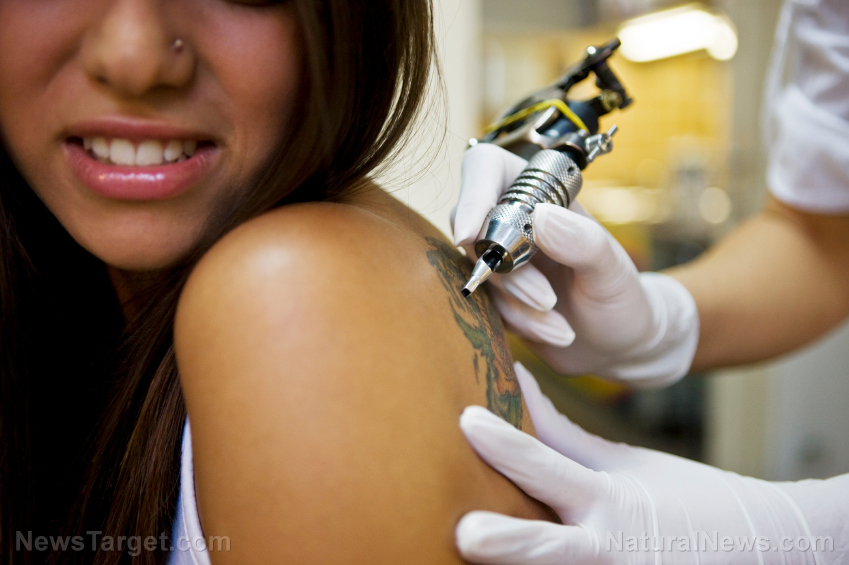Tattoos may lead to HEAT STROKE by impairing your skin’s natural sweat production
04/24/2017 / By Russel Davis

Tattoos may increase the risk of suffering heat stroke, a small study found. To carry out the study, researchers at Alma College, Michigan used a drug called pilocarpine to induce sweating among participants, then collected the sweat samples. The first batch of samples were taken from the tattooed skin, while the other batch was taken from the participants’ non-inked skin at the opposite side of the body. Sweating is a key component of the body’s temperature regulation. Perspiration helps the body cool down as sweat evaporates from the skin.
According to the study, tattooed skin produced less sweat and contained higher sodium concentration compared with the non-tattooed skin. “We are not sure whether it is the ink or the trauma or a combination of both that is responsible for the results that we saw,” said study author Maurie Luetkemeier in DailyMail.co.uk. However, researchers inferred that tattoos inhibit the skin from releasing heat during warm weather. Limited heat loss in turn may lead to higher body temperature and significantly increased risk of heat exhaustion and heatstroke.
The findings were published in the journal Medicine & Science in Sports & Exercise.
Tattoo-related health risks are beyond skin deep
Tattoos have become a pop culture staple over the last few decades. In fact, recent statistics showed that 45 million Americans have at least one tattoo. According to statistics, 36 percent of adults aged 18 to 25 years, and 40 percent of adults aged 26 to 40 years have at least one tattoo. The tattoo industry is estimated to generate revenues of up to $1 billion by 2020.While considered an art form on its own, tattoos pose health risks that go beyond skin deep. These risks include a wide range diseases from chronic allergies to cancers.
The power of the elements: Discover Colloidal Silver Mouthwash with quality, natural ingredients like Sangre de Drago sap, black walnut hulls, menthol crystals and more. Zero artificial sweeteners, colors or alcohol. Learn more at the Health Ranger Store and help support this news site.
A 2015 study found that tattoos induced both short-term and chronic complications in participants. In order to assess the adverse effects of tattoos, researchers examined 300 tattooed participants and found that 10 percent of them experienced some form of short-term complications such as bacterial infection, swelling, and itching. Among these participants, about six in 10 suffered chronic complications. However, researchers found that while many participants experienced swelling or itching for years, few have actually allotted time to have the symptoms checked. The findings were published in journal Contact Dermatitis.
In 2016, the U.S. Food and Drug Administration (FDA) issued new warnings about health risks associated with tattoo ink such as allergic reactions and infections.
Another study revealed that tattoo exposure was linked to an increased risk of hepatitis C infection. The infection can be transmitted through contaminated needles. As part of the research, health experts at Tulane University School of Medicine examined nearly 2,000 patients and found that HCV-infected patients were more likely to have one or more tattoos compared with non-infected controls. The results suggest that “tattoo exposure is associated with HCV (hepatitis C virus) infection, even among those without traditional risk factors. All patients who have tattoos should be considered at higher risk for HCV infection and should be offered HCV counseling and testing,” the researchers wrote in MedicalDaily.com. The findings appeared in the journal Hepatology.
A report by the European Chemicals Agency (ECA) noted that tattoo ink may contain potentially toxic chemicals that may trigger cancer onset. According to the agency, red inks appeared to be the most potentially hazardous color. The report has also stressed that blue, green, and black inks may also lead to certain adverse health effects. “Many reports show concerns for public health stemming from the composition of inks used for tattooing. The most severe concerns are allergies caused by the substances in the inks and possible carcinogenic, mutagenic or reproductive toxic effects,” the agency stated in an article in News.com.au.
Keep yourself risk-free by keeping tabs of the articles at Prevention.news.
Sources:
Tagged Under: cancer, contact dermatitis, FDA, heat stroke, hepatitis C, infection, tattoos




















